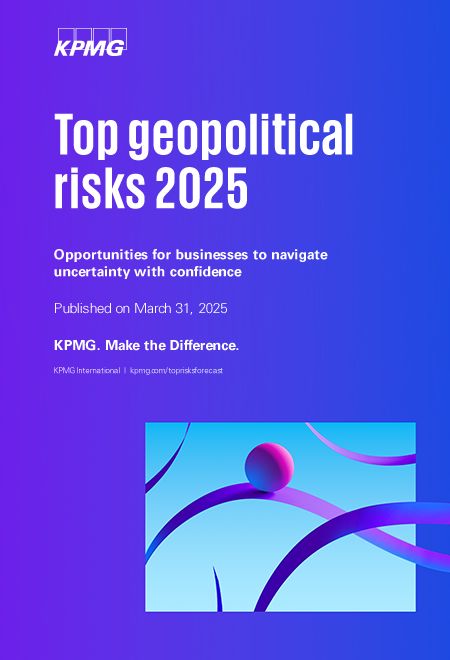For several years now, geopolitical and political uncertainties have been at the top of CEOs' list of concerns, as they have a real, tangible impact on strategic and operational decisions.
Our report "Top geopolitical risks 2025" highlights five specific geopolitical risks that directly affect companies. They range from disruptions to global supply chains to new technology and security issues. For adaptable companies, this not only opens up risks, but also opportunities for innovation and growth.
Serjoscha Keck
Partner, German Head of Industrial Manufacturing, Regional Manager Tax North - Hanover
KPMG AG Wirtschaftsprüfungsgesellschaft
How geopolitical uncertainties influence strategic decisions
In order to remain capable of acting in an uncertain geopolitical landscape, companies should integrate risks into their strategy at an early stage. Scenario analyses help to visualise dependencies and effects and thus make more informed decisions.
Top Trends
The reorganisation of the global economic landscape is taking place on several levels simultaneously: while new trade alliances and investment centres are shifting the existing balance of power, protectionist tendencies - exemplified by US customs policy - are increasing the fragmentation of international trade relations. At the same time, alternative economic centres are establishing themselves as serious competitors to traditional markets.
Regulatory and tax developments vary from region to region: while many countries are implementing the global minimum tax, others are pursuing national strategies and withdrawing from multilateral tax initiatives. This divergence increases the coordination effort and the risk of regulatory inconsistency for internationally active companies.
The global technology world is characterised by geopolitical tensions, fragmented regulations and national security interests.
Competition for future technologies such as AI and quantum computing is intensifying, particularly between the USA and China, which is making international cooperation more difficult and jeopardising global access to innovations.
Trade protectionism, conflicts, the resource race, cyber attacks and climate catastrophes are placing a heavy burden on globally active companies. Wars and tensions are increasingly jeopardising important shipping routes. Countries are increasingly pursuing a dual strategy: on the one hand, they are implementing selective trade restrictions for strategic sectors and, on the other, they are specifically diversifying their supply chains for energy, food and critical raw materials in order to ensure security of supply.
The manufacturing industry is struggling with demographic change: ageing workforces, falling birth rates and a shortage of skilled labour are putting companies under pressure.
At the same time, employee expectations are changing and cultural tensions are increasing.
The introduction of AI and automation requires new qualifications and increased retraining measures to ensure competitiveness.
Opportunities for CEOs in the manufacturing industry in a complex geopolitical environment
To remain competitive, CEOs should shift their strategies from reactive to proactive and establish comprehensive approaches to managing geopolitical risks:
- Expand sources of capital, especially by increasing the involvement of private capital.
- Strengthen compliance structures in order to be able to react flexibly to new regulatory requirements.
- Enhance resilience and reputation through effective cyber security and data management.
- Making supply chains shorter and clearer and focussing more on politically and economically stable countries.
- Invest in corporate culture to keep pace with the changing values and expectations of the workforce.
Download the full report now - and use the geopolitical analysis as a basis for informed strategic decisions.
Methodology
The report contains insights drawn from extensive research, data analyses and case studies, including interviews and workshops with more than 100 KPMG professionals working across many global sectors and with clients of all sizes. Our secondary research includes KPMG reports, literature, academic papers, industry reports and publications from intergovernmental organisations. The content has been reviewed and validated by the authors and contributors.


